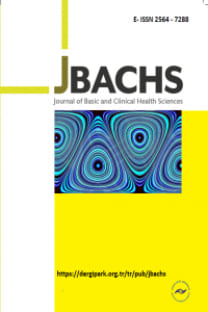Initial Next-Generation Sequencing (NGS) Results of Alport Syndrome
Initial Next-Generation Sequencing (NGS) Results of Alport Syndrome
___
- 1. Kashtan CE. Alport Syndrome. GeneReviews®. University of Washington, Seattle; pp.1993–2019. Available at: http://www.ncbi. nlm.nih.gov/books/NBK1207/
- 2. Kashtan CE. Genetics, pathogenesis, and pathology of Alport syndrome (hereditary nephritis). Uptodate. 2018. Available at: https://www. uptodate.com/contents/genetics-pathogenesis-and-pathology-ofalport-syndrome-hereditary-nephritis?search=alport&source=sear ch_result&selectedTitle=2~40&usage_type=default&display_rank=2
- 3. Nozu K, Nakanishi K, Abe Y, et al. A review of clinical characteristics and genetic backgrounds in Alport Syndrome. Clin Exp Nephrol 2019;23:158–168. [CrossRef]
- 4. Yilmaz VT, Dinckan A, Yilmaz F, Suleymanlar G, Kocak H. Outcomes of Renal Transplantation in Patients With Alport Syndrome. Transplant Proc 2015;47:1377–1381. [CrossRef]
- 5. Kamiyoshi N, Nozu K, Fu XJ, et al. Genetic, Clinical, and Pathologic Backgrounds of Patients with Autosomal Dominant Alport Syndrome. Clin J Am Soc Nephrol 2016;11:1441–1449. [CrossRef]
- 6. Mencarelli MA, Heidet L, Storey H, et al. Evidence of digenic inheritance in Alport syndrome. J Med Genet 2015;52:163–174. [CrossRef]
- 7. Fallerini C, Baldassarri M, Trevisson E, et al. Alport syndrome: impact of digenic inheritance in patients management. Clin Genet 2017;92:34–44. [CrossRef]
- 8. Krol RP, Nozu K, Nakanishi K, et al. Somatic mosaicism for a mutation of the COL4A5 gene is a cause of mild phenotype male Alport syndrome. Nephrol Dial Transplant 2008;23:2525–2530. [CrossRef] https://doi.org/10.1093/ndt/gfn005
- 9. Adıyeke SK, Ture G, Mutlubaş F, et al. Increased Subfoveal Choroidal Thickness and Retinal Structure Changes on Optical Coherence Tomography in Pediatric Alport Syndrome Patients. J Ophthalmol 2019;2019:1–7. [CrossRef]
- 10. Antignac C, Heidet L. Mutations in Alport Syndrome associated with diffuse esophageal leiomyomatosis. Contrib Nephrol 1996;117:172– 82. [CrossRef]
- 11. Gross O, Kashtan CE, Rheault MN, et al. Advances and unmet needs in genetic, basic and clinical science in AS: report from the 2015 International Workshop on AS. Nephrol Dial Transplant 2017;32:916– 924. [CrossRef]
- 12. Savige J, Gregory M, Gross O, Kashtan C, Ding J, Flinter F. Expert guidelines for the management of AS and thin basement membrane nephropathy. J Am Soc Nephrol 2013;24:364–375. [CrossRef]
- 13. Uzak AS, Tokgoz B, Dundar M, Tekin M. A Novel COL4A3 Mutation Causes Autosomal-Recessive AS in a Large Turkish Family. Genet Test Mol Biomarkers 2013;17:260–4. [CrossRef]
- 14. Richards S, Aziz N, Bale S, et al. Standards and guidelines for the interpretation of sequence variants: A joint consensus recommendation of the American College of Medical Genetics and Genomics and the Association for Molecular Pathology. Genet Med 2015;17:405–423. [CrossRef]
- 15. Hertz JM, Thomassen M, Storey H, Flinter F. Clinical utility gene card for: Alport syndrome - update 2014. Eur J Hum Genet 2015;23:1269. [CrossRef]
- Yayın Aralığı: 3
- Başlangıç: 2016
- Yayıncı: DOKUZ EYLÜL ÜNİVERSİTESİ
Emine ACAR, Burak SÖNMEZER, Erkan DEREBEK, Recep BEKİŞ, Özhan ÖZDOĞAN, Gamze Çapa KAYA
Ahmet Çagdaş ACARA, Aslı GÜLER
Tuncay GÖKSEL, Ahmet Emin ERBAYCU, Hakan BAYDUR, Ebru ÇAKIR EDİS, Osman HATİPOĞLU, Kader KIYAR GÜRSU, Burcu BAŞARIK AYDOĞAN, Bedriye ATAY YAYLA, Ayşen ÖZ, Pınar ÇELİK, Sevin BAŞER, Erhan ESER
Initial Next-Generation Sequencing (NGS) Results of Alport Syndrome
Altuğ KOÇ, Tayfun ÇİNLETİ, Ayfer ÜLGENALP, Özlem GİRAY BOZKAYA, Gizem YILDIZ, Elçin BORA, Meral TORUN BAYRAM
Nevcivan GÜLDAŞ, Tuğba UYSAL, Hülya ELLİDOKUZ, Yasemin BAŞBINAR
Ahmet Çağdaş ACARA, Aslı GÜLER
Merve BİLGİÇ, Ali KARAAĞAÇ, Rıfat MUTUŞ
Long-Term Survival With Salvage Surgery in Persistent Lung Cancer
Oğuz ÇETİNAYAK, Barbaros AYDIN, İlhami ER, İlhan ÖZTOP, Nesrin AKTÜRK, Rıza ÇETİNGÖZ, Volkan KARACAM, Meltem KİRLİ, Ayşe Nur DEMİRAL
